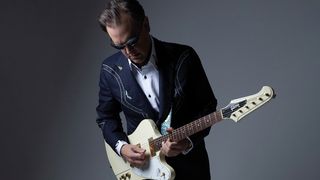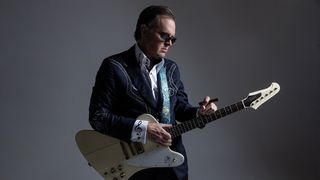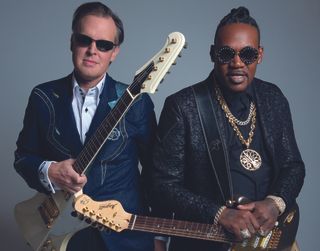Joe Bonamassa: “Songwriting is the last frontier. You can recreate your favorite sounds, but far more important is pushing yourself to write better songs”
JoBo talks Time Clocks – his strongest and most diverse album to date – and discusses his newfound role as 2021’s foremost blues/rock impresario

“Who doesn’t love a good old-fashioned guitar battle?” Joe Bonamassa, calling in from “Nerdville,” his home in Nashville, is referring to the guitar duel that took place between Eric Gales and himself in 2019 during his annual Keeping the Blues Alive cruise in the Mediterranean.
This epic throwdown between two of today’s primary blues/rock virtuosos has garnered well over three million views on YouTube; if you haven’t seen it, do yourself a favor and check it out. It’s a miracle their guitars didn’t spontaneously combust into flames.
“That was so much fun,” Bonamassa says. “Everyone wanted to see Eric and me go at it in a friendly way. And it has to be just like that: it’s not a competition, it’s about spurring each other on in a playful, ‘Can you top this?’ way. It’s really fun for us, and I think it’s fun for the audience to see each of us trying to ‘outdo’ one another, raising the bar as we go.”
Bonamassa has just released Time Clocks, his 15th solo album, on his own J&R Adventures label. Eleven of these albums have reached Number 1 on the Billboard Blues Charts. About the new record, Bonamassa says, “What started out with the intention of being a trio record turned into probably my most adventurous and involved record.”
His longtime producer, Kevin “Caveman” Shirley, adds, “I think Joe has made an album that is truly transitional, from a blues musician to a superstar artist. I’m so thrilled to be along for the ride.” Bonamassa and Shirley also brought the legendary Bob Clearmountain onboard to mix the tracks.
But Bonamassa hasn’t confined his energies to writing, recording, touring and melting faces. He’s also a co-founder of the Keeping the Blues Alive foundation, which functions as a record label and charity for struggling musicians.
In 2020, he worked with Dion on the Blues With Friends album – featuring luminaries such as Van Morrison, Jeff Beck, Paul Simon and Bruce Springsteen – while also producing albums for Reese Wynans, Joanne Shaw Taylor, Joanna Connor, Beth Hart and – with the upcoming release of Crown – Eric Gales.
Get The Pick Newsletter
All the latest guitar news, interviews, lessons, reviews, deals and more, direct to your inbox!
Bonamassa spent some time with us to discuss Time Clocks, as well as his collaboration with Gales.
Let’s begin with your collaboration with Eric Gales on Crown, which you co-produced and co-wrote songs for.
“It all started with Eric’s participation in my Keeping the Blues Alive cruise in August 2019. We’d talked about doing it prior to that, but the stars finally aligned, and here he was. So I said to him, ‘Let’s have a big jam on The Ballad of John Henry.’ I said to the audience, ‘I think you’d like to see this gentleman and me playing over some sludgy blues rock shit in the key of E, just shredding the crap out of some guitars!’ And I refer to him as one of the finest, if not the finest, guitarist in the world today, which I believe he is.”
You and Eric have been friends for almost 30 years, going back to your days in Bloodline in the early '90s.
“That’s right, and I love him. When we have one of these epic throwdowns, no one gets out without a black eye! He’ll play something and I’ll think, ‘Goddam!’ So then I have to hit him with something else.”
A good guitar battle has to be based on friendship and respect, but the audience also wants to see an epic standoff between guitar slingers.
“That’s true, but we pull no punches. That kind of battle just makes everyone better. I know going in that Eric has a fifth gear, so I have to live in the fifth gear, too! When Eric plays, it’s on and there’s no half-power switch; he is coming right at you."
How did the material come together for Eric’s new record, Crown?
“The first thing I did was I listened to all of his records – 17 albums – and I’d sing along to find his range. This way, while I was writing songs for the record, I’d write something with his vocal range in mind.”
A really great tune from the record is Too Close to the Fire.
“I wrote that one in New York with Tom Hambridge. I said, ‘We need a Hendrix-y thing,’ and I came up with the riff on a Strat, thinking, ‘I can see Eric playing this.’ Lyrically, it came from conversations between Eric, Josh Smith and me.
“He played through a Leslie [speaker cabinet] for Let Me Start with This to ramp up a Hendrix vibe on that one, too. His rig was his DV Mark amp, and one of my high-powered Twins, and the two amps together worked really well."
Eric mentioned that when you first convened to put the record together, the George Floyd event had just taken place and the world was riveted on the repercussions that ultimately reverberated around the globe.
“Eric was very emotional about that. I said, ‘You know, Eric, the difference between you and me is that, if I had had the same problems you’ve had, I would have been given more of an opportunity to go to a rehabilitation clinic before I was tossed in jail. And he said, ‘After a while, you get too close to the fire,’ and I thought, ‘I’m writing that down, and I’m writing down more things from these conversations.’
“I had about 35 ‘Eric Gales-isms’ written down, and I would use them in the lyrics. We’d be in the studio and I’d hand him the lyrics to a song, and he’d say, ‘This is stuff that I would say!’ and I said, ‘That’s because it is stuff you said!’ Though often those quotes came from any number of different contexts. And that worked out really well, because I don’t think he would have ended up writing songs like that by himself.”

Let’s talk about your new album, Time Clocks. When did you start working on this record and how did it come together?
“A lot of my records have themes, and the theme here was that I wanted to make a ‘New York’ record. When I record in Nashville, I snap my fingers and a cartage truck brings every possible guitar/amp combo to the studio. But we were at Germano’s [the old Hit Factory] in New York, and I was forced to use just a few pieces of gear and a couple of guitars, and it changed the entire vibe and recording process.
The freedom of having no gear while recording Time Clocks encouraged the feeling of more creativity
“This was like, ‘I want a screwdriver and a hammer,’ and that equated to a reissue Nocaster, 1968 Telecaster with a Parsons/White B-bender, 1954 Strat, 1959 sunburst Les Paul, 1961 dot-neck ES-335, 1965 Rickenbacker 360 12-string, Martin acoustic and one brown Deluxe and one blackface Deluxe Reverb.
“I had been booked to play Love Rocks NYC [an annual charity concert at the Beacon Theatre], so I had a high-powered Twin flown in for that, and it ended up on the record in a few spots, too. The freedom of no gear encouraged the feeling of more creativity."
You use the B-bender on the title track.
“It’s been a really great tool. I was playing through both Deluxes along with a Schaffer wireless replica, like the one Angus Young uses, as a boost. I’m surprised the Deluxes survived because I was running them hard.”
Were all the songs written specifically for this record?
“Two songs were left over from the Royal Tea excursion last year, which are The Loyal Kind, which I wrote with Bernie Marsden, and Time Clocks, which I’d forgotten about. The entire song was in my voice memos as ‘TC demo,’ so I just copied the lyrics from what I thought I said. A free one!
“All of the other songs were written in my apartment in NYC before the sessions with my friend James House from Nashville. Everything was cut ‘three-piece’ – guitar, bass and drums – in New York, and then Kevin [Shirley] added singers, keyboards, didgeridoo and more in Sydney, Australia. Jeff Bova, who we’ve been working with for 15 years, added all of the strings. It was a strange way to make a record but it worked out well.”

Tell me about the two opening tracks, Pilgrimage and Notches.
“Kevin wanted me to open the record with an instrumental, and he had heard Notches, which I’d written with Charlie Starr [Blackberry Smoke]. Jeff Bova, with Kevin’s direction, created an instrumental track and I soloed over it.
“Notches started with this lick I wrote, influenced by Ali Farka Touré and Moroccan music. Charlie had the opening lines of the chorus: ‘I’ve got miles under my wheels and notches in my walking cane.’ The song wrote itself in about 15 minutes around the lick and the vibe of that chorus."
Curtain Call has a bit of that Led Zeppelin/Kashmir vibe.
“At this point, that’s almost perfunctory on any record I do with Kevin Shirley. It’s obligatory: ‘Have we ripped off Kashmir or When the Levee Breaks yet?' [laughs]"
It’s clear you are as interested in elements of pop and creative musical twists as you are with getting a great guitar sound and laying down great guitar parts. The “blues” part of your musical personality is well represented on Time Clocks, but so are these other influences.
“I wrote Curtain Call with James House, and songwriting is the last frontier for me. You can do your best to recreate your favorite sounds, and recreate a vibe, but far more important is pushing yourself to write better songs. The more you push on the front part of the record, the more joyous it is to record the actual record itself.
You can try to mask the problems in the writing with studio tricks, but that does not work. The better the song, the more fun it is to play live and the better everything is
“You know the songs are strong; you aren’t thinking, ‘Well, let’s just put more reverb on it – maybe that will help!’ ‘Let’s flange the chorus!’ You can try to mask the problems in the writing with studio tricks, but that does not work. Also, the better the song, the more fun it is to play live and the better everything is.”
An endeavor of yours that deserves attention is your Keeping the Blues Alive Foundation, which functions as a record label and a charity. Can you describe KTBA?
“Keeping the Blues Alive is something we put together in June 2020 to release albums I produce or co-produce, but it’s also a fundraising organization to help musicians. One of the coolest things to come out of that jam I did on the cruise with Eric was that the guitar I used was custom-built for me by Gibson. It is a replica of one of my 1960 Les Pauls and it features my name inlaid in the fingerboard.
“I thought it would be cool to auction off the guitar, combined with one of my reissue high-powered Fender Twins, as a way to raise funds for the charity. Up until last year, we’d raised about $600,000-$700,000 that went toward music programs in schools.”
“Once Covid hit, I thought we should expand the charity to help the many, many musicians – and other people connected to the live music industry – who were forced to lose their gigs and just sit at home with bills to pay and no income. So we started an offshoot called Fueling Musicians, offering monetary assistance to musicians and crew people, and it’s been a huge success.
“Everyone from Guitar Center to Chicago Music Exchange, Ernie Ball, Gibson, they all kicked in some money, and we did some stream-a-thons and ended up raising another $580,000.
“I decided to put the guitar up for auction as part of the charity, along with the reissue Twin with the serial #1 – the first one! In no time I had a guy who offered to buy both for $50,000. His email said, ‘This is a great cause, and it’s the guitar Joe played with Eric Gales!’ That one auction moved the needle in a very significant way, and the money went on to help a great deal of musicians.”
- Time Clocks is out now via J&R Adventures.

Thank you for reading 5 articles this month**
Join now for unlimited access
US pricing $3.99 per month or $39.00 per year
UK pricing £2.99 per month or £29.00 per year
Europe pricing €3.49 per month or €34.00 per year
*Read 5 free articles per month without a subscription
Guitar World Associate Editor Andy Aledort is recognized worldwide for his vast contributions to guitar instruction, via his many best-selling instructional DVDs, transcription books and online lessons. Andy is a regular contributor to Guitar World and Truefire, and has toured with Dickey Betts of the Allman Brothers, as well as participating in several Jimi Hendrix Tribute Tours.

“AC/DC signed my Strat. I had everybody sign it: Neil Young, Jeff Beck… When Angus saw Beck’s signature he said, ‘Oh, the bouffant!’” Jim Suhler on being married by Billy Gibbons, the advice SRV gave him and why he didn’t pay Joe Bonamassa for a sick solo

“John Mayer said I was one of his favorites on guitar”: One of John Mayer’s favorite contemporary guitarists has been named – and he’s lent his virtuosic skills to Beyoncé, Mac Miller, John Legend and Ariana Grande
Most Popular







